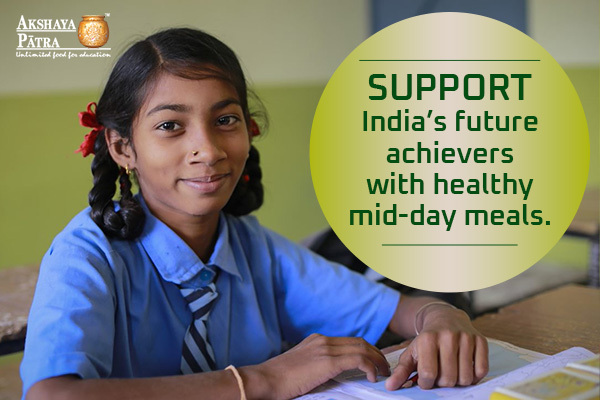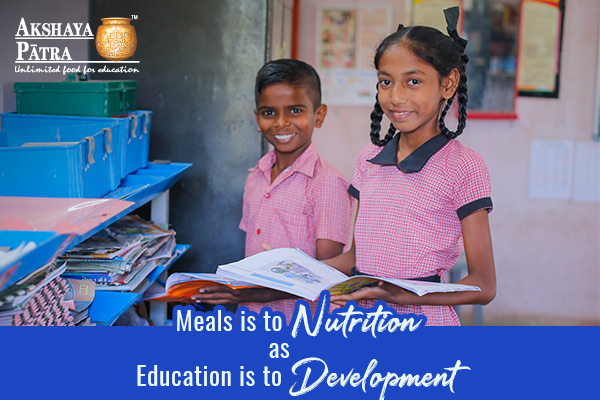
“There are people in the world so hungry, that God cannot appear to them except in the form of bread,” a quote by M.K. Gandhi explains that one can attain no knowledge and wisdom until their hunger is satisfied.
This is true for millions of children who suffer both physically and mentally due to hunger and malnutrition. According to WHO’s 2020 statistics, “globally, 149.2 million children under 5 years of age were stunted, 45.4 million were wasted, and 38.9 million were overweight (
Malnutrition is defined as “sufficient quality and quantity of nutrients to maintain the body system at some definable level of functioning”. Undernutrition in childhood poses the danger of temporary and sometimes, permanent damage to the physical and cognitive development of children. It often becomes the main obstacle for children from underprivileged backgrounds, keeping them from getting educated, excelling in their careers, and surpassing their socio-economic limitations.
In India, NCBI states that more than one-third of India’s population consists of children. And 33 lakh of these children are malnourished. However, many NGOs across India are now working toward a solution to this problem.
Akshaya Patra is one such NGO for charity in India that has been running mid day meals program (MDM) for 1.8 million children from low-income backgrounds for 21 years.
How does malnutrition affect children’s education?
Cognitive development and impaired learning ability: Due to delayed cognitive development from malnutrition, children cannot be attentive for a long period. As a result, a simple math problem like ‘10+5’ that you solve in seconds, becomes a mountainous task for these children.
Studies conducted by UNESCO prove that clinical malnutrition in children can lead to low performance in school. It also affects their decision-making skills necessary for utilizing resources around them to solve problems.
Instead of curiosity during new situations, undernourished children show a phobic reaction. Consequently, nutritional deficiencies hinder their ability to learn, read, write, and connect with peers.
Behavioural alteration: Malnutrition causes severe apathy and irritability in children. They have reduced confidence levels, show low interest in their environment, and become highly emotional during unfavourable situations.
Physical strength: It is known that not all individuals dream to excel in academic fields. Apart from giving rise to such bright minds, India is also home to achievers in sports and field of arts – which activities require high stamina and persistence.
Undernourished children have relatively low energy levels and weak immunity when compared to well-fed children. These aspects interfere with their ability to participate in dynamic activities like sports and other extra-curricular exercises. Lack of healthy food keeps them from participating in non-scholastic events and growing in the areas of their choice.
Weak stamina: Stamina is the strength that helps one sustain physical and mental efforts for long periods. A low calorie intake leads to low stamina in children which affects their ability to focus and retain concepts taught at school.
Long-term health: Deficiency of micronutrients strips children of their immunity to make way for short-term and long-term diseases. Undernourished children are more likely to fall sick from preventable diseases, which may be fatal. In some cases, the damage prevails throughout their life, thus stopping them from exploring their potential.
School dropout rate: Due to low resistance to diseases, undernourished children fall sick easily. Also, the need to earn for their family’s survival, forces these children to skip school. Hence, these two factors often result in low attendance rates and even dropouts from school.
Final Thoughts
Malnutrition is better dealt with while children are growing. Providing them with one balanced meal a day, MDM (works like an incentive) can be a crucial support towards fighting illiteracy and poverty in India.
Akshaya Patra is an NGO for making a charity in India. It has served 441 million mid day meals (MDM) since 2000 and is working relentlessly to do more. The Foundation has partnered with the Central Government to serve school meals to Government and Government-aided schools across India.
Today, 61 kitchens of Akshaya Patra are spread across 14 states and 2 union territories. Following the guidelines by the Supreme Court of India and MHRD, it prepares nutritious meals according to the local palate of different regions across India.
Now, you can contribute towards Akshaya Patra’s mid day meal programme to support improvement in children’s behaviour, immunity, and overall development. Donate to feed the children to help them overcome socio-economic boundaries and strive for new heights.




